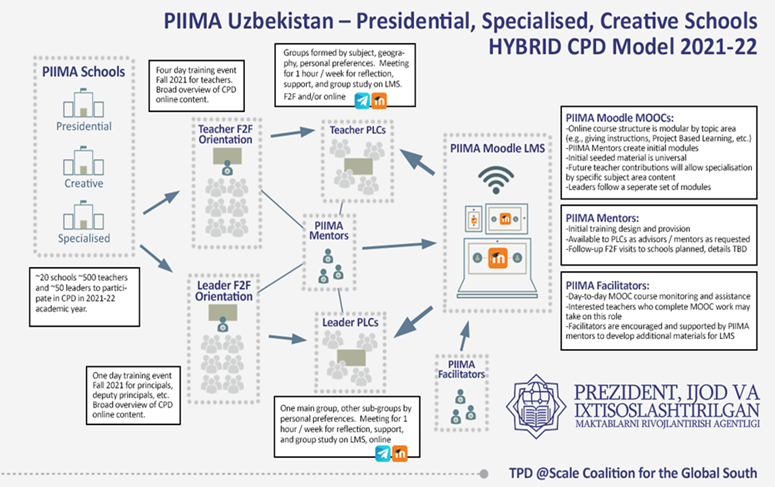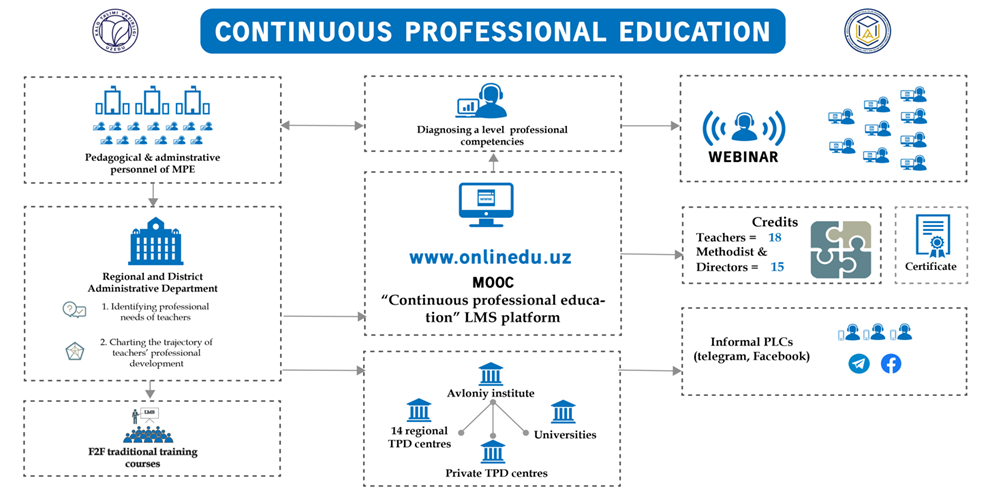Project Information |
|---|
Project Status: Ongoing |
Implementing Organization/s:
Foundation for Information Technology Education and Development, Inc. (FIT-ED) [Lead], SUMMA, Worldreader, UNESCO |
Funder/s:
International Development Research Centre / Global Partnership for Education Knowledge and Innovation Exchange (GPE-KIX) |
Duration: April 2020 to January 2023 Location/s: Ghana, Honduras, Uzbekistan |
Project Leader:
Victoria L. Tinio, Executive Director, FIT-ED Contact: Clarisse Gomez Senior Program Manager FIT-ED |
Through the “Adapting and Scaling Teacher Professional Development Approaches in Uzbekistan” project, UNESCO Tashkent is examining how the teacher professional development at scale (TPD@Scale) framework can be applied in Uzbekistan to improve equitable access to quality TPD. More specifically, this action aims to develop a framework and guidelines for adapting, implementing, evaluating and continuously improving upon proven TPD@Scale models, or core components of such models, in the Uzbek context, and for different sub-groups of teachers, as an approach to scaling in-service teacher training.
UNESCO Tashkent, in partnership with the Agency for Presidential Educational Institutions of the Republic of Uzbekistan (PIIMA), developed the model for the teachers of creative, gifted and special needs children (see Figure 1). Teacher training courses have been developed for the following topics: Project-based Learning, Inquiry-based Learning, Curriculum and Objectives-based Lesson Planning, Backwards Lesson Planning, Classroom Assessment Standards, and Leadership to enhance teachers’ modern pedagogical skills.

Figure 1. PIIMA model for teachers of creative, gifted and special needs children
The model moves the focus away from the subject-based approach towards a whole-of-school approach. First, school principals and teachers undergo the training together; second, the teachers participate in online training modules while engaging with mentors. Teachers gain reflections with professional learning communities (PLCs) and apply the knowledge and experiences they acquired to their classroom teaching. Classroom application is considered as the key element of this model as well as teachers’ self-assessment, taking into account not only their students’ academic performance but also their emotional well-being.
The Project conducted the first field testing phase in eight schools located in four regions: Khiva, Nukus, Namangan and Tashkent city in order to explore teachers TPD experiences through in-depth individual interviews and focus group discussions with 69 participants: Grades 5 to 11 teachers in eight subjects, mentors and school principals.
Research findings inform improvements to the model, and have also been disseminated among national stakeholders, such as the National Research Institute named after A. Avloniy under the Ministry of Public Education (Avloniy Research Institute), the main governmental body in charge of training public school teachers. Avloniy Research Institute has joined the Project as a partner to test and scale their model for training primary and secondary teachers in the public education sector (see Figure 2). This model enables a shift from periodic to continuous TPD. Teachers are able to choose four different TPD opportunities offered by regional TPD Centers, private TPD centers, universities and the onlinedu.uz platform.

Figure 2. Avloniy Research Institute model for the teachers in the public education sector (K11: primary and secondary education)
Field testing for this model was conducted in four regions: Karakalpakstan, Navoiy, Kashkadarya and Tashkent city with participation of 184 teachers, methodologists and school principals (1-11 grades).
For teachers of creative, gifted and special needs children
For teachers of the public education sector
Bakhtiyor Namizov
Country Lead
UNESCO Tashkent Office
Nargiza Kuchkarova
Co-Research Lead
Agency for Presidential Educational Institutions of the Republic of Uzbekistan (PIIMA)
Dilfuza Khamidova
Research Assistant
UNESCO Tashkent
Cher Ping Lim
Technical Advisor for Uzbekistan
Education University of Hong Kong